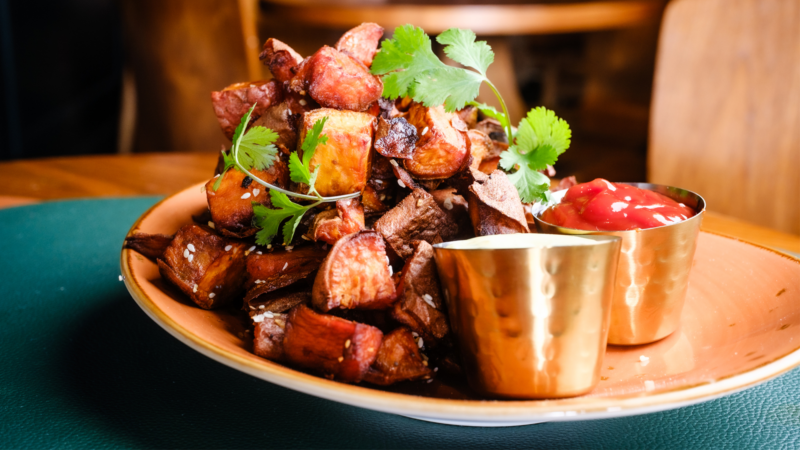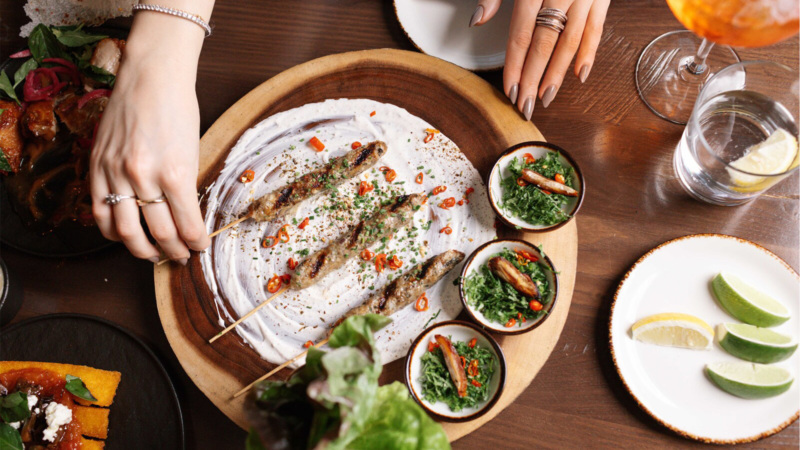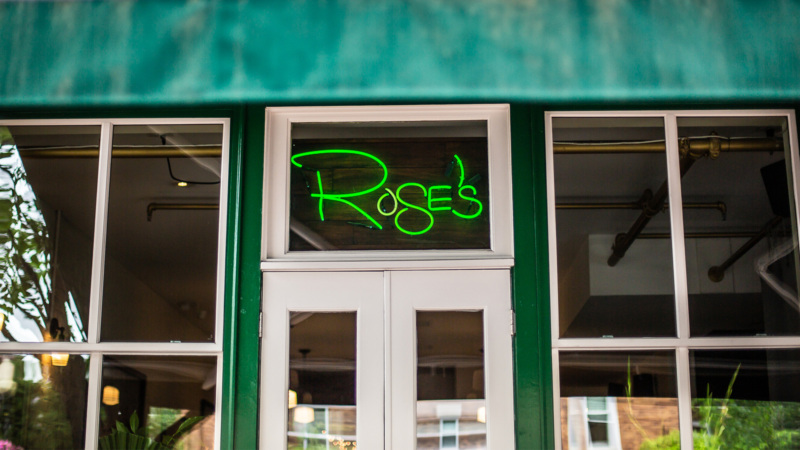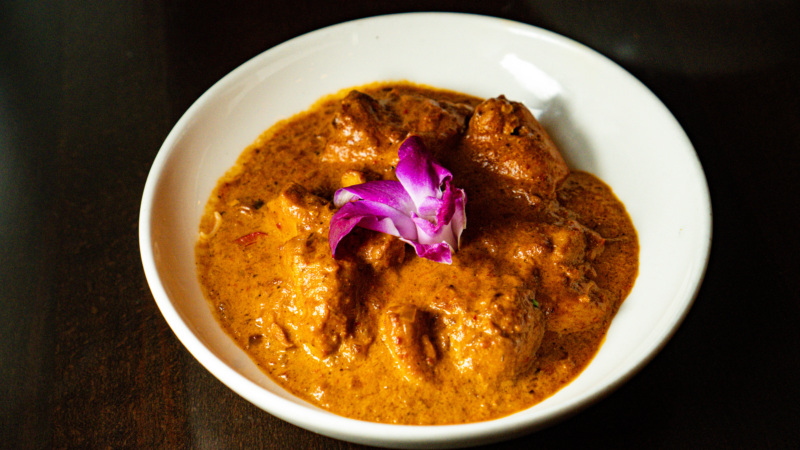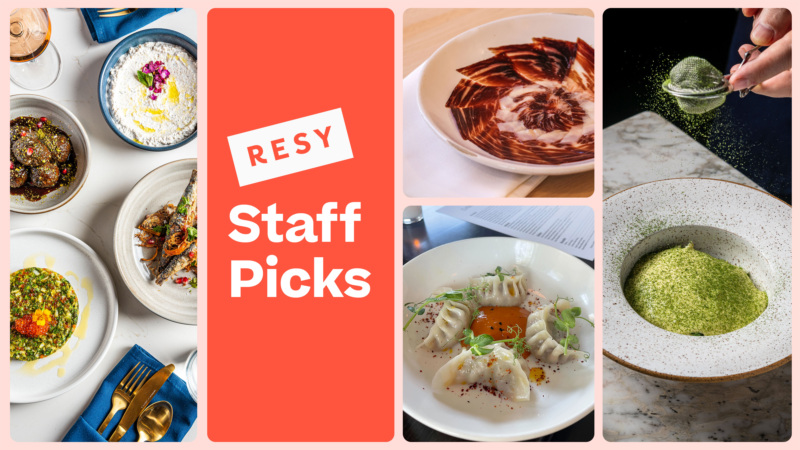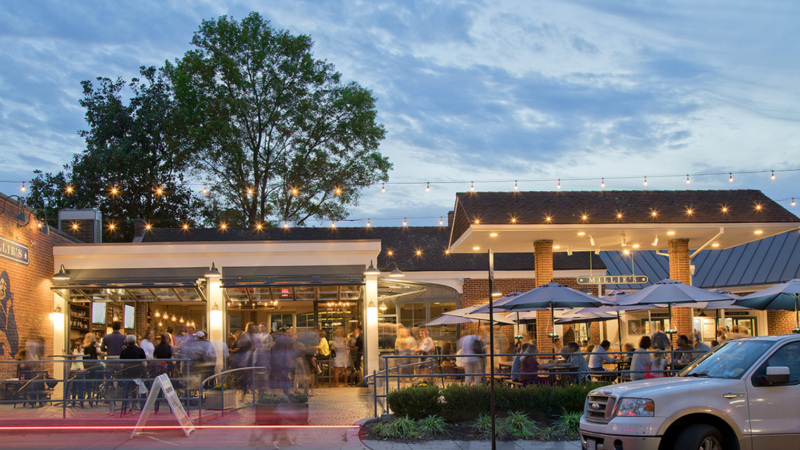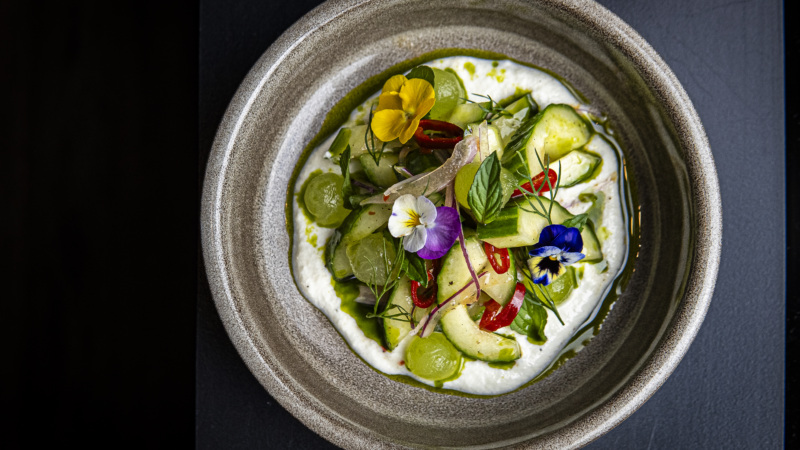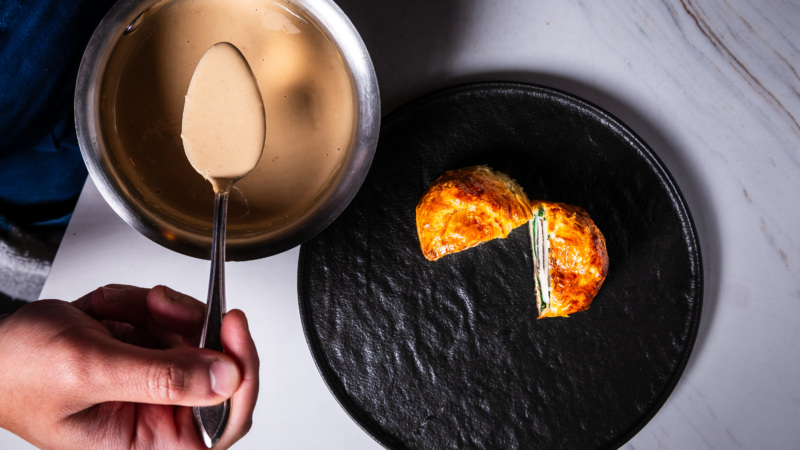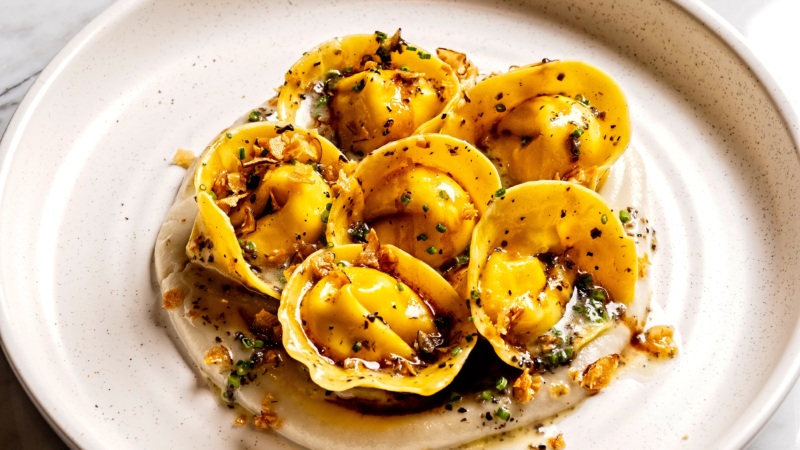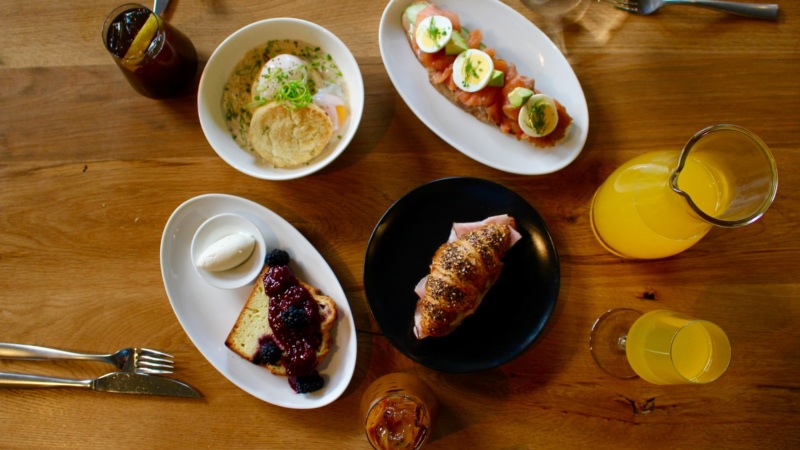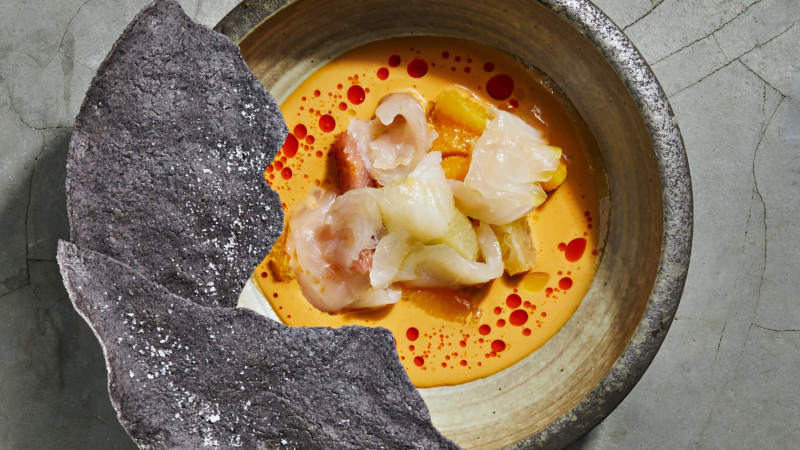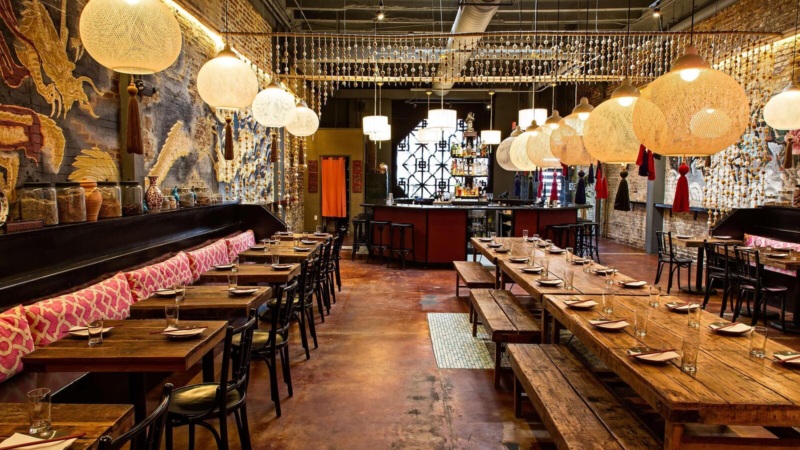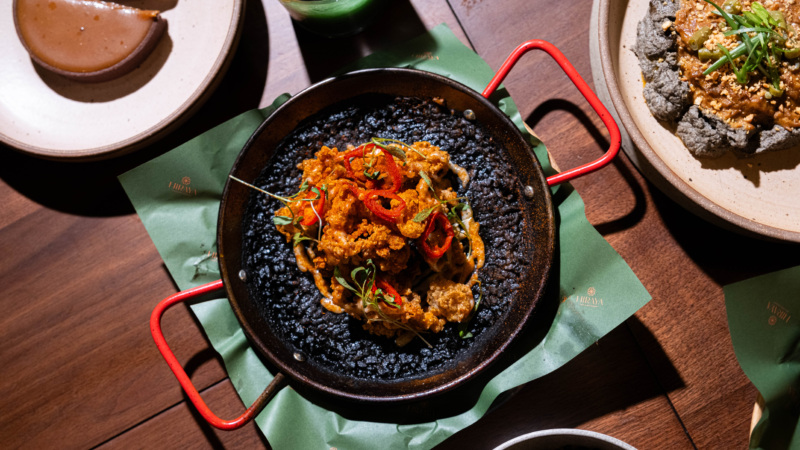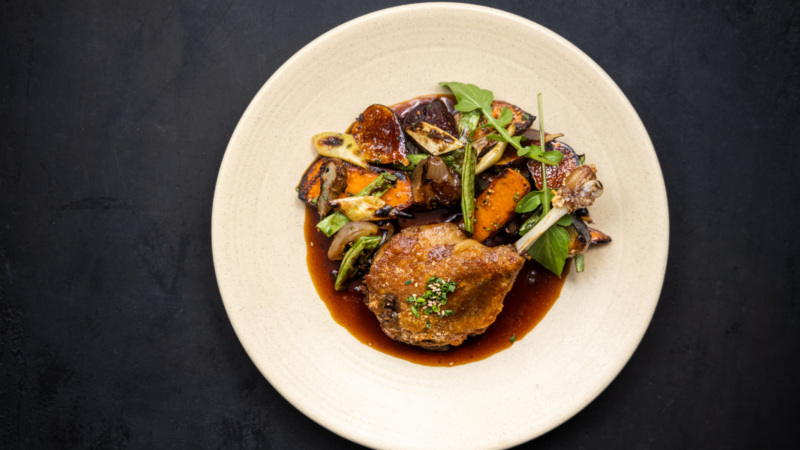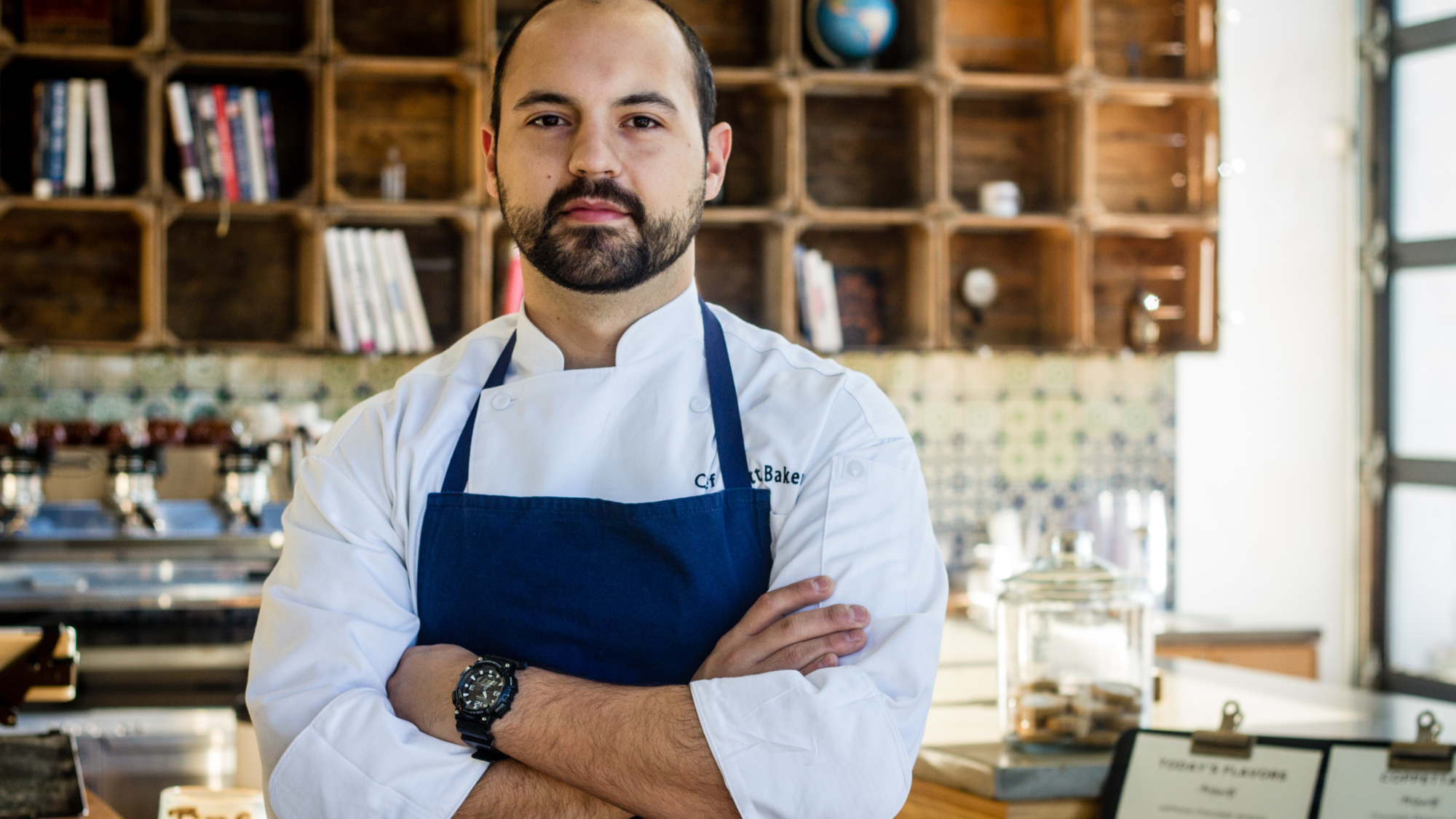
Gravitas’ Matt Baker Has Been Weathering the Pandemic. His Preparation Started Years Ago.
The first time I met Matt Baker at his new American cuisine restaurant Gravitas, he said he was sorry.
This was last year, months before the restaurant earned a Michelin star, when my boyfriend and I hit up Gravitas for its weekend brunch debut. And about 10 minutes after our arrival, the power went out. That outage, the result of construction near Union Market nearly two miles away, extended into the Ivy City neighborhood where Baker’s restaurant is based, leaving 1,200 Pepco customers without power for several hours, and parts of the Union Market neighborhood not restored until the next morning.
Baker and his staff handled the issue with aplomb, having gone through two power outages within the last three months beforehand. He personally walked from table to table, apologizing to guests. Gas stoves allowed staff to prepare most of what was on the menu, but they still passed out rosé, offered tea, and brought out free dishes: sourdough pancakes, a bread basket, soft poached eggs to make up for the food and coffee the kitchen couldn’t make.
That day, three other eateries around Gravitas closed and sent staff home. Not Baker. He lost up to $1,400 handing out freebies, but the restaurant remained open because Saturdays are crucial for business, particularly for staff depending on tips.
“I felt it was the right thing to do, to serve the guests,” Baker said at the time.
Whether it’s been power outages or construction delays that dragged on a year, Gravitas has experienced a litany of issues — not of its own making — since before the restaurant opened in 2018. None compare to what it continues to endure with COVID-19. And Baker’s experience during this bleak period mirrors what other restaurants have gone through, underscoring how vulnerable Michelin-tapped restaurants are to the pandemic.
Yet his experience stands out, as an example not only of the flexibility that elite tier of restaurateurs has had to embrace, but also as a tale of learning to be adaptable well before COVID ever arrived. At a time when chefs of Baker’s caliber are being scrutinized — for their ability to downshift from fine dining, for their commitment to a more diverse dining landscape — Gravitas stands as an example of making good choices.
That’s why, for instance, he intended to build on his 2019 Michelin star by expanding the bar, lounge and patio section. Each would have had separate à la carte menus, which in turn would have turned the dining room into a smaller, intimate space — upending the Gravitas experience at a time when doing more of the same would have been prudent.
And then COVID upended all those plans, putting Baker into survival mode. His choices in recent months kept the restaurant afloat at a time when similar ones have faced closure.
Like embracing takeout. With an airy space bathed in natural light, the minimalist fine-dining restaurant in the former Pappas Tomato Factory is known for $150 tastings with foie gras-stuffed squab and vichyssoise, not as a carryout shop. Gravitas quickly shifted to offering takeout and delivery, following Mayor Muriel Bowser’s March suspension of sit-down service at restaurants and bars.
That wouldn’t be unique. But Baker found a particularly novel way to keep going. Instead of highlighting his own cooking, the takeout menu pulled inspiration from his staff’s immigrant families and cultures. Line cooks’ posole and pupusas shared menu space with sous-chefs’ enchiladas and lamb shoulder.
Spaghetti and meatballs, a wagyu flat-iron steak, enchiladas. This wasn’t the cuisine that propelled the restaurant to status. But Baker is candid that he didn’t feel comfortable recreating the Gravitas experience to go. It was better to turn the menu over to kitchen staff so they could shine.
“I felt very strongly that our front-line employees and our immigrant employees were the most at risk and were the people that are going to be the most at risk of furloughs, at risk of getting this disease,” Baker says. “So I really wanted to give them the attention and let them tell the story.”
That’s not to say the pivot was entirely seamless.
Customers occasionally complained the food wasn’t hot, or didn’t meet their expectations. Baker issued them refunds. Gravitas implemented a new system to prepare food in a timelier fashion, and switched to different heat-retentive packaging. Those changes came in tandem with extensive new cleaning procedures: contactless sanitizing stations all over the restaurant; ammonia disinfecting spray and industrial-strength, bleach-based wipes to clean nearly every surface. All employees have to wear masks at all times.
▪️▪️▪️
After six weeks of takeout and delivery service, Baker closed Gravitas for about a month starting April 27 to regroup. “We talked about it as a team, and we checked in with everybody, and I just felt it was time to take a break,” he says.
That closure was eased by a loan from the Small Business Administration’s Paycheck Protection Program, which paid staff, and the District’s Small Business Recovery Microgrant for operations costs. But they didn’t cover thousands of dollars Baker says he’s spending on masks and gloves for employees. The restaurant flies through two cases of gloves a day because anyone touching a table, a plate or glasses must change their gloves and sanitize in between so there’s no cross contamination. This is exactly the sort of expense, he points out, that local or federal programs could ease through a tax write-off or other means, but haven’t.
At the same time, Baker was trying to minimize employees’ financial pain. During the monthlong closure, he gave furloughed staffers at highest risk a severance, and helped employees fill out documents for unemployment and government assistance. He stepped in to financially support those who didn’t get that assistance. And while two employees contracted COVID during the closure, both have since recovered and are back on the job. When D.C. launched the first phase of its reopening May 29, Gravitas was able to open its doors, having rehired 80 percent of its 36 employees.
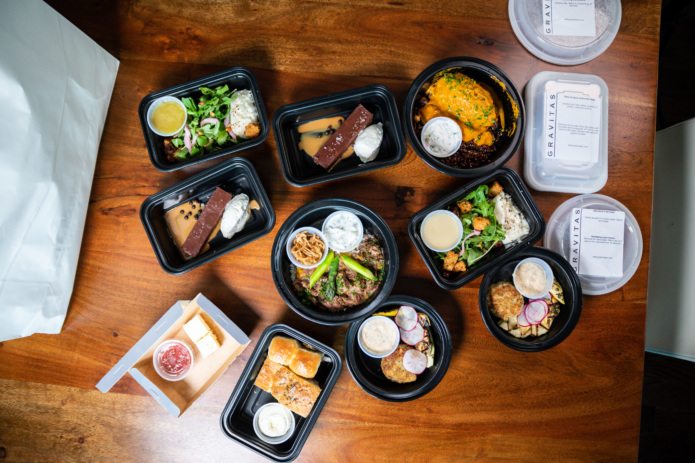
Things are still a ways from normal, of course. When Gravitas guests call or make reservations online, they’re asked to provide names, phone numbers, and email addresses for themselves and their guests, so Gravitas can conduct contact tracing. Guests also have the option of contactless payment with a preauthorized credit card. Once inside the restaurant, diners get their temperature taken. Staff members record the temperature and the time it was taken onto the reservation, and anyone with a temperature above 99.8 degrees is asked not to dine. (Employees get their temperatures taken as well.) Assuming your temperature checks out, staff will ask you to wear a mask whenever you aren’t at the table.
For Baker, part of this is about building a sense of safety, with the onus on Gravitas to put customers at ease.
“If they’re going to take the risk on their side, we want to make sure they feel as comfortable and confident in the process and the experience as possible,” he says. “And additionally if they feel that, we feel strongly that they will spread that message to others and say, ‘We just ate at Gravitas, they’re taking all the right steps. You should eat there too, because it’s time.’ ”
Gravitas took another gamble: trying outdoor dining for the first time, using 30 seats. That presented a fresh headache outside Baker’s control: the weather. On the days it rained — and there’ve been several — guests ate in the restaurant’s 16-seat covered atrium area, with its open windows. Baker kept the carryout and delivery, but shifted to a new, $55-a person, four-course takeout menu featuring Moroccan chicken tagine, beef Bourguignon, Indian zucchini, coq au vin and the like. And he rolled out new menus for dining in, including a $115 summer garden menu with Vietnamese-style grilled quail, Korean barbecue eggplant and roasted wagyu beef ribeye among other items. The most recent iteration offers crab and chili linguini, roasted Amish chicken roulade, seared black bass and more.
▪️▪️▪️
Yet even Gravitas’ experiment in the outside air wouldn’t last: Two days after reopening, at Bowser’s recommendation, the restaurant closed down again, this time over the uprising following George Floyd’s killing in police custody.
The ongoing protests haven’t reached Ivy City, but the curfews the mayor imposed took another hit on the restaurant. Baker estimates he lost $10,000 when he closed Gravitas for two shifts on May 31 and June 2.
While some owners in the city boarded up their restaurants, Baker didn’t go that route. He didn’t like the message it would send. Instead, he and staff made Black Lives Matter and other racial justice signs to temporarily display in the windows. He gave staff time off to protest. Before the protests even started, Baker says he talked about the current events during staff lineup to make sure everyone was OK, that their voice was heard.
And even though Baker describes Gravitas as “an inclusive environment,” the racial reckoning gripping the United States has made him think more deeply about his place in the restaurant industry. He has two Black employees on staff at Gravitas, and pays several Black teenagers from the neighborhood to wash dishes and bus tables. In the past, he’s hired Black bartenders, hosts and a Black sous chef.
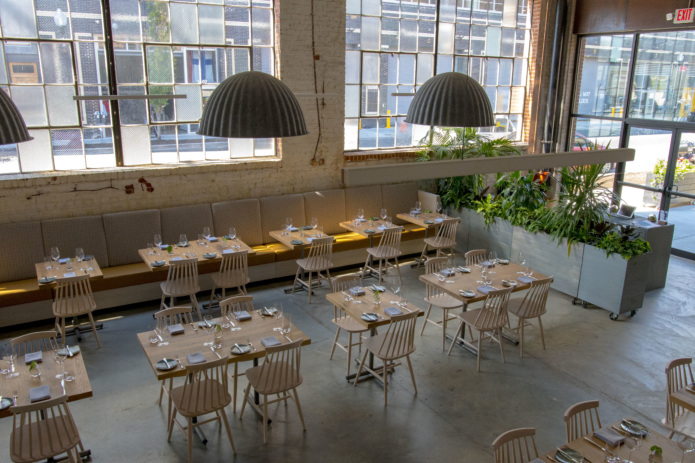
He and his wife, Lindsay Jordan Baker, the restaurant’s co-owner, keep looking at ways they can make Gravitas a more inclusive, approachable environment, thinking about what could have been done differently and what they can do in the future. They’ve consciously decided that staff diversity is a priority at Gravitas — a project that they see as unlikely ever to be complete. There is always, Baker stresses, a need to constantly look at themselves and ask questions.
While later phases of the District’s reopening plan allowed indoor seating, Gravitas decided to continue offering outdoor dining — in part because it’s proven to be a valuable source of extra revenue. Baker estimates the pandemic has cost the restaurant nearly $1 million compared to its earnings with all 110 seats available.
▪️▪️▪️
This more freeform approach seems to have stuck. Later this summer, Baker is launching another project, Baker’s Daughter, an all-day, gourmet grocery and café offering prepared food across the street from Gravitas. It will serve standalone dishes, as well as four-course prix fixe meals priced at $55. They can be eaten there, carried out or delivered. Baker will change the meal lineup daily and the cuisine for the à la carte dishes seasonally. A prix fixe might include Parker House rolls, Maryland crab cakes with a frisée-and-citrus salad and sauce remoulade, and Korean barbecued salmon. He’ll split staff between the two places to protect against the pandemic — with the side benefit of being able to shift them to the café if business is slow at Gravitas.
This approach comes from knowing that nothing will be the same for quite some time — which again marks Baker as different from some fine-dining colleagues who keep pushing toward a return to normal. Even when restaurants are allowed to operate at full capacity and there’s a vaccine, Baker is clear: the fallout from the pandemic won’t end until guests feel comfortable going out in public again. And yes, there will be higher prices — although as Baker is quick to point out, the extra money helps his immigrant employees receive paid time off and access to health care.
This is the sort of learning that comes from having learned to be adaptable, well before COVID — to make a way out of no way. Even so, Baker doesn’t want to jinx himself by saying he can get through anything.
“The next thing you know, a meteor hits in the middle of DC and that’s the new ‘anything’ that I now have to figure out how to deal with,” he says. “So, as long as that’s the caveat …”
Lenore T. Adkins is a freelance food writer based in Washington, D.C., who has been eating her way through the District for six years. Her work has appeared in the Washington Post, the James Beard Foundation website, Eater DC and elsewhere. Follow her on Instagram and Twitter. Follow Resy, too.

